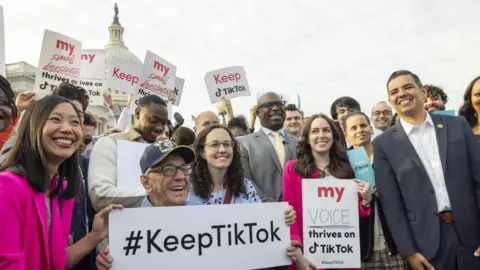Can TikTok's owner afford to lose its killer app?
BBC carries an article about US lawmakers who could vote this weekend on a second bill that corners TikTok's Chinese owner ByteDance, Caliber.Az reprints the article.
US lawmakers could vote this weekend on a second bill in as many months that corners TikTok's Chinese owner ByteDance with a stark choice - sell its US business or be banned.
Fears that data about millions of Americans could land in China's hands have driven Congressional efforts to split TikTok from the Beijing-based company.
TikTok has said ByteDance "is not an agent of China or any other country". And ByteDance insists it's not a Chinese firm, pointing to the many global investment firms that own 60 per cent of it.
But the app's extraordinary success in the US has made it yet another flashpoint between Washington and Beijing.
Some 170 million Americans spend at least an hour of their day swiping on TikTok. That includes about six in 10 teenagers, a fifth of whom say they are on it "almost constantly", according to Pew Research Centre. More than 40 per cent of US users say it's their regular source of news.
A ban on TikTok could be challenged as a violation of free speech. It's also difficult to police and possibly unpalatable in an election year. While forcing ByteDance to sell the app is seemingly simpler, that option also faces obstacles.
For one, analysts say Beijing will try its best to scupper a sale. But who will buy TikTok's US operations, which, by some estimates, could fetch up to $100 billion (80.2 billion pounds)?
And the biggest question of all: Would ByteDance sell its most successful app?
Tick tock
Founded in 2012 by Chinese entrepreneurs, ByteDance first hit the jackpot with short video app Douyin in China. A year later, it launched TikTok, an international version. TikTok was banned in China but gained a billion users in five years.
It is now run by a limited liability company based in Los Angeles and Singapore but is essentially owned by ByteDance. While its founders own only 20 per cent of ByteDance, it's the controlling stake in the company. About 60 per cent is owned by institutional investors, including major US investment firms such as General Atlantic, Susquehanna and Sequoia Capital. The remaining 20 per centis owned by employees around the world. Three of its five board members are American.

But Beijing's grip over private companies in recent years worries the US about how much control the Chinese Communist Party has over ByteDance, and the data it holds. These concerns are not unfounded. Last year, a former ByteDance employee alleged in a lawsuit that Beijing had accessed TikTok user data in 2018 to spy on pro-democracy protesters in Hong Kong - ByteDance dismissed this as "baseless".
The US has been cracking down on China's massive footprint on its soil as intelligence officials increasingly warn of espionage, surveillance and hacks. In 2022, Washington banned the sale and import of communication devices from five Chinese companies, including Huawei and ZTE. Now, the suspicion has spread to infrastructure such as Chinese-made cranes that are common in US ports, including those used by the military.
Beijing has dismissed these concerns as American paranoia and has warned that a TikTok ban will "inevitably come back to bite the US".
Since 2022, TikTok has been routing all US users' data through Texas-based technology giant Oracle to address security concerns. TikTok has stressed US data will be ringfenced and stored on Oracle servers in the US.
TikTok's Singaporean CEO Shou Zi Chew was grilled by Congress twice in less than a year, and downplayed the app's connection - and his personal links - to Chinese authorities. His repeated reminders that he is Singaporean and not Chinese went viral. And he said after the House vote that TikTok "will continue to do all [they] can, including exercising [their] legal rights" to protect US users' access to the app. TikTok pointed to his statement in response to the BBC's queries.
Despite ByteDance's attempts to reassure Washington, the US House of Representatives voted in March to give ByteDance six months to sell TikTok to non-Chinese owners, or have the app blocked in the US. That bill is still pending Senate approval. On April 20 they are expected to vote again on the same measure - except this time it's bundled with other bills that promise aid to Ukraine, Israel and Taiwan.
The newer version gives ByteDance nine months to decide TikTok's fate - if the Senate passes it and if the chances for a sale look promising, President Joe Biden can further extend the deadline by another 90 days. Mr Biden has already said he would sign it into law when it reaches his desk.
Putting a price on TikTok
Valuing TikTok for a sale is tricky.
As a privately-owned company, it does not release financial details, but reports estimate its US revenue stood between $16 billion to $20 billion in 2023, making up as much as 16 per cent of ByteDance's revenue.
"In a normal market, it won't be hard to fetch a $100 billion valuation. However, under the current political risks and lack of liquidity, the valuation would take a big hit if a transaction does happen," said Li Jianggan, who runs Singapore-based venture capital firm Momentum Works.
In other words, it would be akin to a distress sale, a further blow for ByteDance's bottom line.

And arm-twisting ByteDance will not work, analysts say.
"It will just shut down [in the US] rather than make a few billion dollars," said Ling Vey-Sern, an adviser for Asia technology at Swiss private bank Union Bancaire Privée.
A ban would still allow it to return "when circumstances change, while a sale means a more definite outcome", Mr Li said.
The US wouldn't be the first to block TikTok - India banned the app in 2020, citing security concerns. But TikTok survived that ban because the Indian market, which was then about as big as the US market is now, wasn't as profitable, said Jayanth N Kolla, founder of technology advisory firm Convergence Catalyst.
The US is now TikTok's largest market, accounting for about 17 per cent of its total users, and its most lucrative. "If TikTok were to lose its US operations, it is not just losing the user base, but a large portion of its revenue pie. That's an immense loss," Mr Kolla said.
Who wants TikTok?
For one, not many companies can afford to buy TikTok. And those with deep enough pockets, such as Meta or Alphabet, could be stymied by anti-competition laws.
The other major obstacle is whether the deal will include TikTok's so-called recommendation engine. The AI-driven secret sauce that feeds content to users is crucial to the app's success.
When the US last tried to force a sale in 2020, ByteDance said the addictive algorithm, which it owns, was not on the table. But selling TikTok without the algorithm would neither allay Washington's concerns nor attract buyers.
The algorithm is the "most contentious" part of any deal, Mr Li said. "Any potential acquirer just buying TikTok's user base and content will probably be looking for a heavy discount."
And replicating it is hard because analysts say companies like that operate in China are far better at targeting users. They have a huge market to tap into, which means AI models have more information and practice to get better. Companies can also mine more data because regulation is weak and the Communist Party itself runs a sophisticated surveillance state.
A sale also leaves open the question of how a US-owned TikTok interacts with the app elsewhere. "Imagine if TikTok [users from outside the US] want to send TikToks to the US," said Anupam Chander, a law professor specialising in global tech regulation at Georgetown Law.
"How do we know that isn't Chinese propaganda? Do we now have to prevent foreign accounts from being seen by Americans? That begins to sound a lot more like what China did a quarter-century ago."








